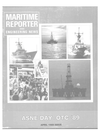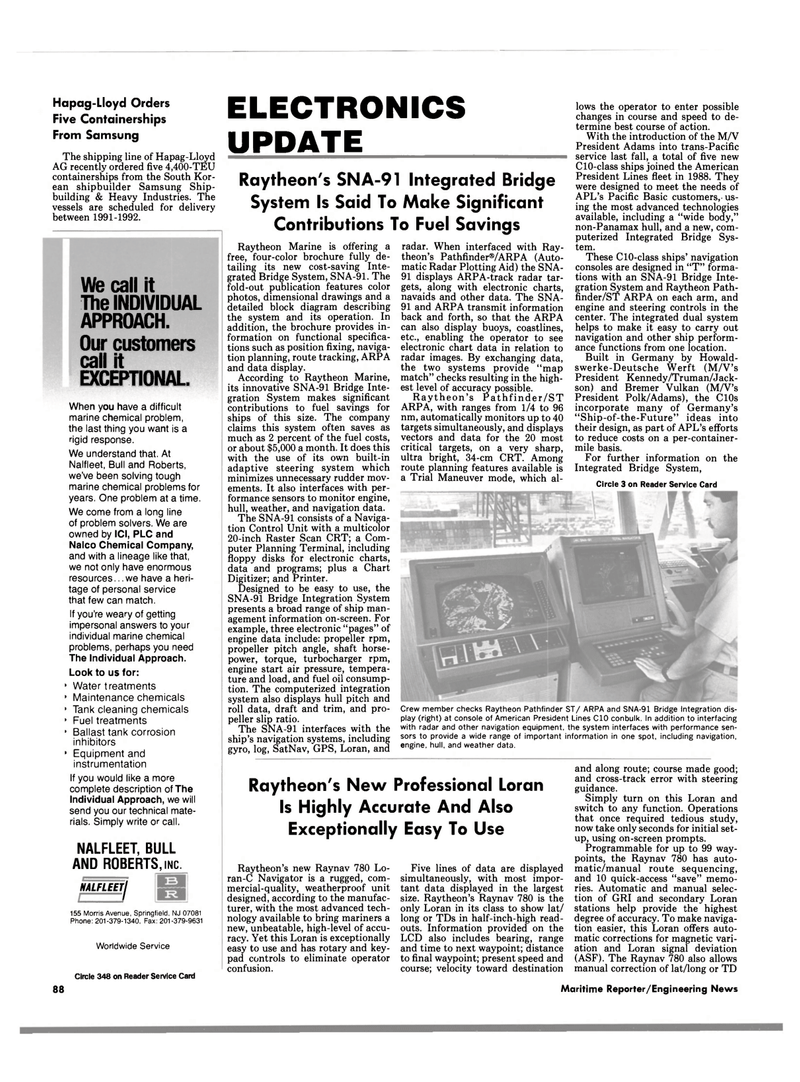
Page 86: of Maritime Reporter Magazine (April 1989)
Read this page in Pdf, Flash or Html5 edition of April 1989 Maritime Reporter Magazine
Hapag-Lloyd Orders
Five Containerships
From Samsung
The shipping line of Hapag-Lloyd
AG recently ordered five 4,400-TEU containerships from the South Kor- ean shipbuilder Samsung Ship- building & Heavy Industries. The vessels are scheduled for delivery between 1991-1992.
We call it
The INDIVIDUAL
APPROACH.
Our customers call it
EXCEPTIONAL.
When you have a difficult marine chemical problem, the last thing you want is a rigid response.
We understand that. At
Nalfleet, Bull and Roberts, we've been solving tough marine chemical problems for years. One problem at a time.
We come from a long line of problem solvers. We are owned by ICI, PLC and
Nalco Chemical Company, and with a lineage like that, we not only have enormous resources... we have a heri- tage of personal service that few can match.
If you're weary of getting impersonal answers to your individual marine chemical problems, perhaps you need
The Individual Approach.
Look to us for: • Water treatments • Maintenance chemicals • Tank cleaning chemicals • Fuel treatments • Ballast tank corrosion inhibitors • Equipment and instrumentation
If you would like a more complete description of The
Individual Approach, we will send you our technical mate- rials. Simply write or call.
NALFLEET, BULL
AND ROBERTS, INC.
NALFLEETi 1 155 Morris Avenue, Springfield, NJ 07081
Phone: 201-379-1340, Fax: 201-379-9631
Worldwide Service
ELECTRONICS
UPDATE
Raytheon's SNA-91 Integrated Bridge
System Is Said To Make Significant
Contributions To Fuel Savings
Raytheon Marine is offering a free, four-color brochure fully de- tailing its new cost-saving Inte- grated Bridge System, SNA-91. The fold-out publication features color photos, dimensional drawings and a detailed block diagram describing the system and its operation. In addition, the brochure provides in- formation on functional specifica- tions such as position fixing, naviga- tion planning, route tracking, ARPA and data display.
According to Raytheon Marine, its innovative SNA-91 Bridge Inte- gration System makes significant contributions to fuel savings for ships of this size. The company claims this system often saves as much as 2 percent of the fuel costs, or about $5,000 a month. It does this with the use of its own built-in adaptive steering system which minimizes unnecessary rudder mov- ements. It also interfaces with per- formance sensors to monitor engine, hull, weather, and navigation data.
The SNA-91 consists of a Naviga- tion Control Unit with a multicolor 20-inch Raster Scan CRT; a Com- puter Planning Terminal, including floppy disks for electronic charts, data and programs; plus a Chart
Digitizer; and Printer.
Designed to be easy to use, the
SNA-91 Bridge Integration System presents a broad range of ship man- agement information on-screen. For example, three electronic "pages" of engine data include: propeller rpm, propeller pitch angle, shaft horse- power, torque, turbocharger rpm, engine start air pressure, tempera- ture and load, and fuel oil consump- tion. The computerized integration system also displays hull pitch and roll data, draft and trim, and pro- peller slip ratio.
The SNA-91 interfaces with the ship's navigation systems, including gyro, log, SatNav, GPS, Loran, and radar. When interfaced with Ray- theon's Pathfinder®/ARPA (Auto- matic Radar Plotting Aid) the SNA- 91 displays ARPA-track radar tar- gets, along with electronic charts, navaids and other data. The SNA- 91 and ARPA transmit information back and forth, so that the ARPA can also display buoys, coastlines, etc., enabling the operator to see electronic chart data in relation to radar images. By exchanging data, the two systems provide "map match" checks resulting in the high- est level of accuracy possible.
Raytheon's Pathfinder/ST
ARPA, with ranges from 1/4 to 96 nm, automatically monitors up to 40 targets simultaneously, and displays vectors and data for the 20 most critical targets, on a very sharp, ultra bright, 34-cm CRT. Among route planning features available is a Trial Maneuver mode, which al- lows the operator to enter possible changes in course and speed to de- termine best course of action.
With the introduction of the M/V
President Adams into trans-Pacific service last fall, a total of five new
ClO-class ships joined the American
President Lines fleet in 1988. They were designed to meet the needs of
APL's Pacific Basic customers,- us- ing the most advanced technologies available, including a "wide body," non-Panamax hull, and a new, com- puterized Integrated Bridge Sys- tem.
These ClO-class ships' navigation consoles are designed in "T" forma- tions with an SNA-91 Bridge Inte- gration System and Raytheon Path- finder/ST ARPA on each arm, and engine and steering controls in the center. The integrated dual system helps to make it easy to carry out navigation and other ship perform- ance functions from one location.
Built in Germany by Howald- swerke-Deutsche Werft (M/V's
President Kennedy/Truman/Jack- son) and Bremer Vulkan (M/V's
President Polk/Adams), the ClOs incorporate many of Germany's "Ship-of-the-Future" ideas into their design, as part of APL's efforts to reduce costs on a per-container- mile basis.
For further information on the
Integrated Bridge System,
Circle 3 on Reader Service Card
Crew member checks Raytheon Pathfinder ST/ ARPA and SNA-91 Bridge Integration dis- play (right) at console of American President Lines C10 conbulk. In addition to interfacing with radar and other navigation equipment, the system interfaces with performance sen- sors to provide a wide range of important information in one spot, including navigation, engine, hull, and weather data.
Raytheon's New Professional Loran
Is Highly Accurate And Also
Exceptionally Easy To Use
Circle 348 on Reader Service Card
Raytheon's new Raynav 780 Lo- ran-C Navigator is a rugged, com- mercial-quality, weatherproof unit designed, according to the manufac- turer, with the most advanced tech- nology available to bring mariners a new, unbeatable, high-level of accu- racy. Yet this Loran is exceptionally easy to use and has rotary and key- pad controls to eliminate operator confusion.
Five lines of data are displayed simultaneously, with most impor- tant data displayed in the largest size. Raytheon's Raynav 780 is the only Loran in its class to show lat/ long or TDs in half-inch-high read- outs. Information provided on the
LCD also includes bearing, range and time to next waypoint; distance to final waypoint; present speed and course; velocity toward destination and along route; course made good; and cross-track error with steering guidance.
Simply turn on this Loran and switch to any function. Operations that once required tedious study, now take only seconds for initial set- up, using on-screen prompts.
Programmable for up to 99 way- points, the Raynav 780 has auto- matic/manual route sequencing, and 10 quick-access "save" memo- ries. Automatic and manual selec- tion of GRI and secondary Loran stations help provide the highest degree of accuracy. To make naviga- tion easier, this Loran offers auto- matic corrections for magnetic vari- ation and Loran signal deviation (ASF). The Raynav 780 also allows manual correction of lat/long or TD 88 Maritime Reporter/Engineering News

 85
85

 87
87
